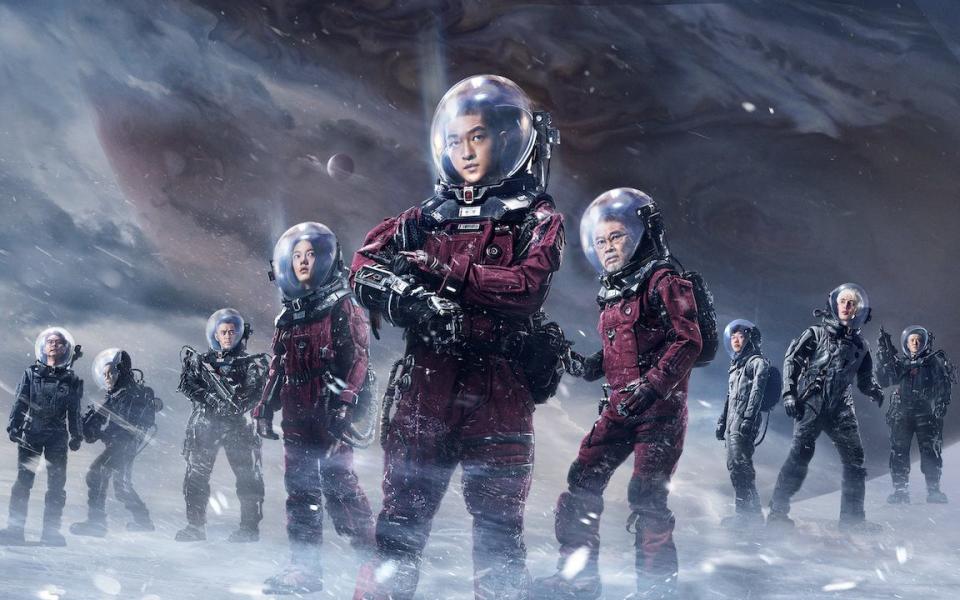What is The Three-Body Problem? Inside the Game of Thrones creators' cerebral, sexless new series

The accusation frequently levelled at David Benioff and DB Weiss as Game of Thrones limped through its disastrous final seasons was that the show-running duo were skilled adaptors who had run out of road. With George RR Martin’s A Song of Ice and Fire saga unfinished, “D&D” had been forced to cobble together their own conclusion to this epic tale of under-clothed, over-sexed kings, queens and dragons. And heavens, what a mess they made of it.
In the end there seemed to be a flub at every turn. Red Weddings and heart-breaking beheadings were replaced by creaky dialogue and endless shots of Emilia Clarke trying to look as if she was going mad but totally not feeling it. Benioff and Weiss stood accused of being enthusiastic hacks out of their depth in trying to compete with Martin’s ferocious and fecund imagination.
The other complaint that grew louder as Game of Thrones rumbled towards the finish line was that the pair were too fond of female nudity and gratuitous sex scenes, to the point of creepiness. What had felt daring and transgressive in 2011 had, by 2019, come to seem crass, exploitative – tasteless at best, sleazy at worst (there was a belated attempt to correct course with token quantities of full-frontal male nudity).
Fourteen months on from the GoT finale, in their first collaboration with Netflix as part of a $200 million deal, Benioff and Weiss seem to have struck upon the perfect way of neutering their critics. Once again, it has been announced, they are to adapt a doorstopper fantastical saga with a cult readership and breathtaking set-pieces.
The difference is that Liu Cixin’s the Three-Body Problem trilogy is very much done and dusted. This means Benioff and Weiss will be spared a repeat of the scenario in which they had to stay up all night brainstorming ways to have Jon Snow not become King of Westeros.

Oh and there’s barely any sex in the novel by the Chinese writer – or even characters with much interest in sex. So there will be no pressure on Benioff and Weiss to bung in pointless sequences of young actresses stepping out of the bath in their altogether.
And yet, in other ways, the Three-Body Problem feels like a strange – even shocking – swerve for Benioff and Weiss. With Game of Thrones, they proved perfectly suited to the milieu of gritty low fantasy – at home in a universe chockfull of betrayal, bare-bums and people saying the the c-word.
Cixin’s novels are entirely different – an anti-Game of Thrones if you will. Firstly, they are science fiction rather than Martin’s “grimdark” fantasy. And the books, which chronicle a struggle between humanity and a race of amoeba-like aliens trying to flee their doomed planet, are intensely cerebral.
Indeed, if Cixin has forerunners it isn’t Martin but big-brained sci-fi authors such as Arthur C Clarke and Isaac Asimov. As with those writers and their output, The Three-Body Problem and its sequels the Dark Forest and Death’s End, are big on brain-numbing grand concepts but not too bothered about characters, dialogue or action. These are qualities that tend to be highly valued on television.
Cixin's plot is almost as difficult to encapsulate as that of A Song of Fire and Ice. In the original 2006 novel – first published in English in 2014 – the story cuts between scientists uncovering a conspiracy in the present day and the struggles of a young engineer in the years following China’s bloody Cultural Revolution of the Sixties and Seventies.

The conspiracy is global and centres around an alien race, the Trisolarans, who are en route to invade Earth. Their own world, Trisolaris, has three suns. As the suns move across the heavens, the weather flips, seemingly at random, between Stable and Chaotic Eras (during the latter Trisolarans shed all moisture and go into hibernation). In Earth they see a solution to their woes: a planet with just one sun and a stable environment.
There’s no need to panic about the Trisolarans. Not yet at any rate. They have set off for our Solar System but won’t reach it for another 450 years – meaning they will arrive just in time for the publication of The Winds of Winter, George RR Martin’s next A Song Of Ice and Fire novel.
The complicating factor is that the scientists aware of the invasion have split into two camps. There are those who wish to help the aliens solve their triple-sun “three-body problem” and so remain in situ on the other side of the galaxy. And those eager to assist the Trisolarans in wiping out humanity. The logic being that humans, having wreaked such havoc in the environment, deserve to be driven extinct.
This brings us back to the post-Cultural Revolution section of the novel and astrophysicist heroine Ye Wenjie. With her life ripped asunder by the anarchy of the revolution, she ends up working on a secret Chinese initiative to disable American spy satellites. By bouncing radio waves off the sun she contacts the Trisolarans , alerting them to the existence of Earth. And so begins the conspiracy stumbled upon in the present day by mild-mannered nanotechnology professor Wang Miao.
The sci-fi components become more pronounced as the later novels skip forward through the centuries. There are space battles between various Earth factions and with the Trisolarans , who have finally reached their destination. The upshot is that Benioff and Weiss won’t have to bash out their own conclusion to the story. The alternate timelines, skipping between Miao in the present and Wenjie in the past will, as a bonus, permit them reprise their favourite Game of Thrones strategy of cutting between various characters.
On top of all that, a successful adaptation of these acclaimed sci-fi novels would give Benioff and Weiss bragging rights over Star Wars and Lucasfilm, with whom they parted ways after agreeing to oversee a new Jedi trilogy. The split was dressed up last year as a mutual decision. But one rumour was that Lucasfilm’s corporate overlords at Disney were spooked by the backlash to the dreadful Game of Thrones finale. The mutterings were that they didn’t trust Benioff and Weiss with the keys to their Super Star Destroyer.
“D&D” will also no doubt feel vindicated should the Three-Body Problem hand Netflix an advantage over Game of Thrones’s network HBO. Three years ago it was announced that Benioff and Weiss were to make an original series with HBO set in an alternative history United States where the South never lost the Civil War and slavery continued through to the present.
However, a twitter backlash led HBO to quietly cancel plans for Confederate (at one point the hashtag #NoConfederate was trending at number one in the United States and number two globally). Not long afterwards Benioff and Weiss announced their deal with Disney – and then a $200 million production exclusive with Netflix. Sticking it to HBO may well be on their “to do” list.
Of course no matter how successful their new project, doubts will continue to linger over Benioff and Weiss’s talents as writers. In the final two seasons of Game of Thrones, they proved abject at creating new storylines. Have they perhaps accepted that their true calling is as translators rather than as creators in their own right?
Fans of Cixin’s novels will have their own questions. Such as: are the duo who created the concept of “sexposition” qualified to shepherd to the screen a slow-moving Kubrickian odyssey?
The Three-Body Problem is, after all and in many ways, a throwback. With A Song of Ice and Fire, George RR Martin sought to drag Tolkien-style high fantasy kicking and screaming into the real world. Golden prince Jaime was involved in an incestuous affair with his twin; brave king Robert vanquished his foes only to become an obese lech; the noble Lord of Winterfell, Ned Stark, had seemingly fathered a child out of marriage. If Hobbits existed in Martin’s universe they would probably have been sex-crazed foot fetishists.
Cixin, by contrast, is entirely faithful to the erudite sci-fi of past decades. Indeed, had Benioff and Weiss wanted to adapt a lusty, thrilling saga with an Asian setting they could have looked no farther than the writings of Lin’s English translator Ken Liu. His Dandelion Dynasty trilogy takes place in a swords-and-sorcery re-imagining of medieval China and brims with battles, betrayal and forbidden love.
That would seem a far better fit for Benioff and Weiss. The challenge they face with the Three-Body Problem is to inject emotion into a rather desiccated text.
“Like Isaac Asimov, Liu is far more interested in science than character development, and his heroes and villains are all thinly written,” went an Onion AV Club analysis of the English-language translation of Cixin. “Liu constantly tells rather than shows when it comes to his characters’ motivations….The novel also delivers physics-based scientific explanations, often in large and pedantic text dumps when characters are discussing or experimenting with technology…The result is a book that offers a unique perspective on science fiction, but isn’t much fun to read.”

This won’t be the first time Cixin’s work has been brought to screen. A 2019 adaptation of his short story The Wandering Earth was a huge hit in the film’s native China. But its portrayal of dutiful functionaries saving the planet after it is knocked from its orbit failed to chime with international audiences – of the movie’s worldwide $700 million gross, China made up $693 million.
But maybe Benioff and Weiss spot an opportunity where others see only pitfalls. The Three-Body Problem and its sequels have a century-spanning plot and mind-blowing set-pieces. And yet in the cracks of the story is room for human drama.
And so the duo will presumably be free to include as much nudity and shocking violence as they wish (Netflix may be banking on it). The balancing act between epic and intimate, sexed-up and soulful will be difficult to pull off. But if they can do it with the Three-Body Problem, Benioff and Weiss may be on their way to solving the most intractable conundrum of all: proving to their detractors that there is life after Game of Thrones.

 Yahoo Movies
Yahoo Movies 
